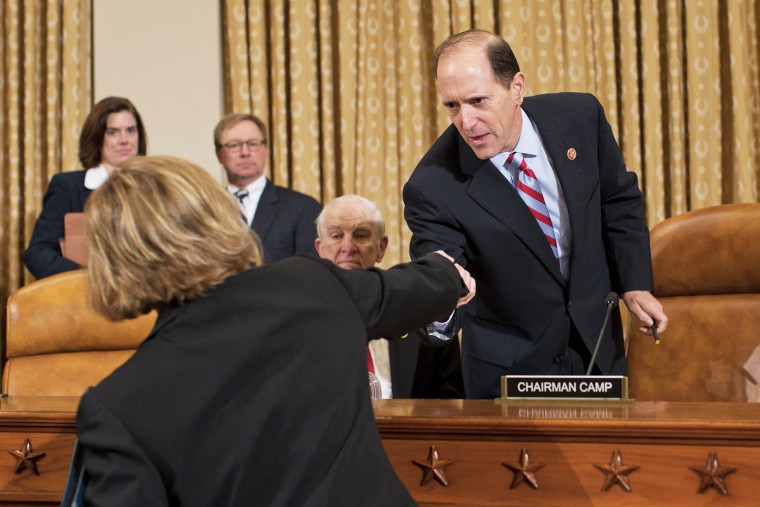What can a Republican Congress and Democratic White House reasonably expect to work on?
One big issue came up quite a bit yesterday.
National Republican Senatorial Committee Chairman Jerry Moran (Kan.) said the new Senate GOP majority will first focus on the basic tasks of governing.... But he added that GOP leaders would also set their sights on ambitious goals such as tax reform. "Tax reform is a great opportunity for the Senate and the House to come together," he said. "I think there's still a huge opportunity for the Senate to find common ground on tax reform," Moran added. "I think the country's economy, people's jobs, significantly demand that tax reform."
In the
new op-ed from House Speaker John Boehner (R-Ohio) and incoming Senate Majority Leader Mitch McConnell (R-Ky.), the nation's top two GOP lawmakers added that addressing "the insanely complex tax code" is one of the Republicans' biggest priorities.
Best of all, President Obama also
expressed an interest in tax reform, highlighting the issue as a priority during his White House press conference.
Taken together, one might be tempting to think something might actually get done on this issue.
But that's extremely unlikely, and it's important to understand why.
First, let's take a quick look at
recent history. It's easy to forget, but soon after Obama's re-election, Republican leaders identified tax reform as an area for possible bipartisan compromise. House Republicans gave tax reform the special H.R. 1 designation, a symbolic bill number intended to convey its significance. House Ways and Means Committee Chairman Dave Camp (R-Mich.), to his credit, invested three years of his life on a plan to overhaul the nation's federal tax code, and unlike the usual Republican m.o., he actually presented a real reform plan.
Soon after, Boehner and his team
killed the bill, concluding that it'd be an unwelcome distraction from election-year priorities such as Benghazi and complaints about the Affordable Care Act.
By March 2014, Republican officials thanked Camp for working so diligently on tax reform, then
declared his plan dead. According to Camp's own GOP allies, his plan would receive no debate, no hearing, and no vote.
Asked in the spring about the substance of Camp's tax-reform bill, Boehner said, quite literally, "
Blah, blah, blah, blah."
Now, however, Republicans have returned to the issue as a possible area of compromise. Maybe they mean it this time? It's possible, but there's a reason tax reform isn't going to happen, and the president
touched on it briefly yesterday:
"We all agree on the need to create more jobs that pay well. Traditionally, both parties have been for creating jobs rebuilding our infrastructure -- our roads, bridges, ports, waterways. I think we can hone in on a way to pay for it through tax reform that closes loopholes and makes it more attractive for companies to create jobs here in the United States."
This may sound quite sensible, but it's exactly why bipartisan tax reform is probably impossible. It goes like this:
1. Both parties see value in cleaning up the tax code and scrapping loopholes.
2. Cleaning up the tax code and scrapping loopholes would generate new revenue.
3. The parties have diametrically opposed visions on what to do with the money.
For Democrats, it makes sense to use the revenue generated by tax reform to invest in job creation. After all, we need to make infrastructure investments anyway, and taking advantage of these resources would mean making the investments without raising tax rates or cutting spending elsewhere.
For Republicans, any new revenue generated by tax reform must go to new tax cuts. Every penny. No exceptions.
Tax reform isn't a bad idea. It's just not likely to happen.
